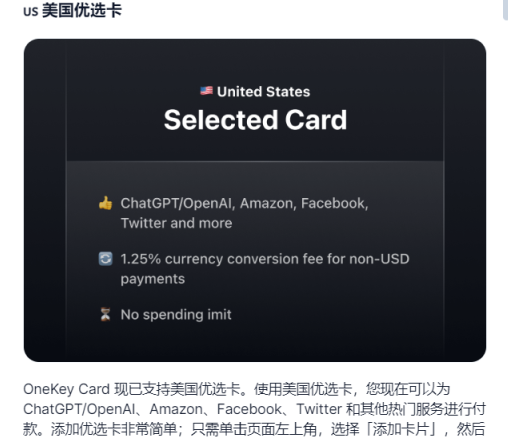Original link: https://tumutanzi.com/archives/17042

There is a saying in the currency circle: one day in the currency circle, one year in the world. The same is true for the financial industry. The bank card products of the two virtual credit cards, Dupay and OneKey Card, which I paid attention to before, have recently returned to normal after a period of inoperability (mainly because the United States has strengthened supervision on cryptocurrencies), and there are some new changes.
One of them, OneKey Card, after abolishing the original old card number segment, has launched several new cards. The strength is the launch of the US Premium Card, which supports OpenAI’s ChatGPT bill payment. There are also card numbers issued in Hong Kong. The main application scenario is that in addition to supporting the currency consumption of the card itself (there are two types of Hong Kong dollars and US dollars), it also supports binding domestic WeChat and Alipay to support RMB consumption.
However, the OneKey Card has an additional 1.25% currency conversion fee, plus its own recharge rate of 1.5%. Overall, at least the rate for RMB consumption is close to 3 points, which I think is not cheap.
After the Dupay card was suspended some time ago, netizens were worried whether the team behind it ran away—although I always thought it had no motivation to run away (because it continued to make more money), it finally resumed normal use recently. Including the same card number, support for WeChat and Alipay consumption of RMB, and the fee rate are all unchanged. The only change is that the name has been changed from Depay to Dupay, and the OpenAI ChatGPT bill payment is not supported… This really makes many Friends who came to support this application scenario were disappointed.
In my opinion, Dupay is also in a good state now. It has achieved the purpose of using cryptocurrencies in China as RMB consumption. Compared with OneKey Card, its rate is lower and the exchange rate is better. Overall, the rate can be lower up to 1.8%.
Overall, although the current OneKey Card has more comprehensive payment application scenarios than the Dupay card, and supports both domestic and foreign consumption (especially OpenAI bills), the Dupay card can achieve the purpose of domestic consumption of cryptocurrency users at a lower cost. Both have their advantages and disadvantages, depending on the purpose of the users.
After the suspension some time ago, we can also see that the teams behind the two products are doing things seriously. The team behind the OneKey Card is more powerful and well-known, but the persistence of the Dupay card for so many years has also proved that it has its own unique way of survival.
As for applying for the above bank cards, KYC information is required, which is a last resort. Most countries in the world require strict KYC information when dealing with bank fiat currency-related businesses. Friends who are obsessed with personal information privacy want to use products and services related to bank card fiat currency, and there is almost no solution.
Finally, let me answer why I care about this type of product. In short, like the Hong Kong calling card before, products like OneKey Card and Dupay card have opened up the channel from cryptocurrency to legal currency, and easily support foreign non-RMB payment scenarios. Freedom of communication and financial freedom are two things I am very concerned about. If you understand it, you will naturally understand it, and if you don’t understand it, you don’t need to understand it.
According to different usage scenarios, if friends need to register two credit cards, they can choose as appropriate:
- My Dupay registration and installation referral link (invitation code 525694): www.depay.one
- My OneKey Card registration referral link (invitation code XSYCDX): https://card.onekey.so
related articles
This article is transferred from: https://tumutanzi.com/archives/17042
This site is only for collection, and the copyright belongs to the original author.